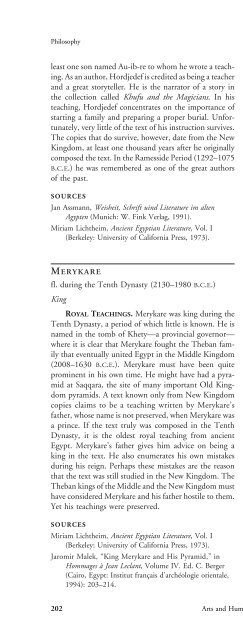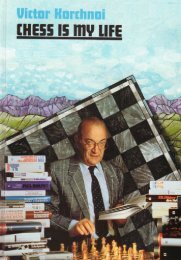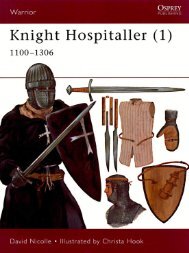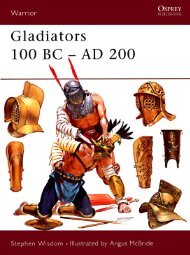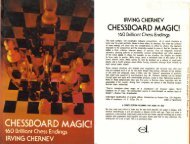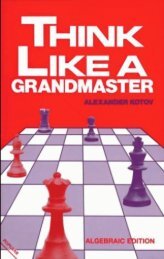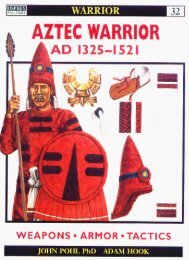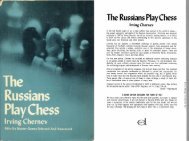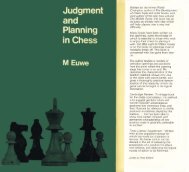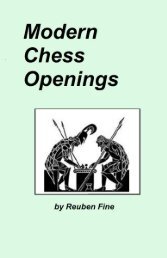Through the Eras
Edward Bleiberg ed., Ancient Egypt (2675-332 ... - The Fellowship
Edward Bleiberg ed., Ancient Egypt (2675-332 ... - The Fellowship
Create successful ePaper yourself
Turn your PDF publications into a flip-book with our unique Google optimized e-Paper software.
Philosophyleast one son named Au-ib-re to whom he wrote a teaching.As an author, Hordjedef is credited as being a teacherand a great storyteller. He is <strong>the</strong> narrator of a story in<strong>the</strong> collection called Khufu and <strong>the</strong> Magicians. In histeaching, Hordjedef concentrates on <strong>the</strong> importance ofstarting a family and preparing a proper burial. Unfortunately,very little of <strong>the</strong> text of his instruction survives.The copies that do survive, however, date from <strong>the</strong> NewKingdom, at least one thousand years after he originallycomposed <strong>the</strong> text. In <strong>the</strong> Ramesside Period (1292–1075B.C.E.) he was remembered as one of <strong>the</strong> great authorsof <strong>the</strong> past.SOURCESJan Assmann, Weisheit, Schrift uind Literature im altenAgypten (Munich: W. Fink Verlag, 1991).Miriam Lich<strong>the</strong>im, Ancient Egyptian Literature, Vol. I(Berkeley: University of California Press, 1973).MERYKAREfl. during <strong>the</strong> Tenth Dynasty (2130–1980 B.C.E.)KingROYAL TEACHINGS. Merykare was king during <strong>the</strong>Tenth Dynasty, a period of which little is known. He isnamed in <strong>the</strong> tomb of Khety—a provincial governor—where it is clear that Merykare fought <strong>the</strong> Theban familythat eventually united Egypt in <strong>the</strong> Middle Kingdom(2008–1630 B.C.E.). Merykare must have been quiteprominent in his own time. He might have had a pyramidat Saqqara, <strong>the</strong> site of many important Old Kingdompyramids. A text known only from New Kingdomcopies claims to be a teaching written by Merykare’sfa<strong>the</strong>r, whose name is not preserved, when Merykare wasa prince. If <strong>the</strong> text truly was composed in <strong>the</strong> TenthDynasty, it is <strong>the</strong> oldest royal teaching from ancientEgypt. Merykare’s fa<strong>the</strong>r gives him advice on being aking in <strong>the</strong> text. He also enumerates his own mistakesduring his reign. Perhaps <strong>the</strong>se mistakes are <strong>the</strong> reasonthat <strong>the</strong> text was still studied in <strong>the</strong> New Kingdom. TheTheban kings of <strong>the</strong> Middle and <strong>the</strong> New Kingdom musthave considered Merykare and his fa<strong>the</strong>r hostile to <strong>the</strong>m.Yet his teachings were preserved.SOURCESMiriam Lich<strong>the</strong>im, Ancient Egyptian Literature, Vol. I(Berkeley: University of California Press, 1973).Jaromir Malek, “King Merykare and His Pyramid,” inHommages à Jean Leclant, Volume IV. Ed. C. Berger(Cairo, Egypt: Institut français d’archéologie orientale,1994): 203–214.DOCUMENTARYSOURCESin PhilosophyAnonymous, The Dialogue of a Man with His Ba (c. 1938–1759 B.C.E.)—This philosophical text describes a mandebating suicide with his own soul. It gives a clear indicationof Egyptian belief in a soul and <strong>the</strong> consequencesof suicide. The text breaks off before <strong>the</strong> end so <strong>the</strong>result is not clear.Anonymous, The Eloquent Peasant (c. 1938–1759 B.C.E.)—In this philosophical study, a corrupt official falselyimprisons a farmer. The farmer’s pleas for justiceamount to a treatise on maat (“right conduct”).Anonymous, Teachings for Merykare (c. 2130–1980 B.C.E.)—An unnamed king writes advice for his son, <strong>the</strong> futureking Merykare of <strong>the</strong> Tenth Dynasty. Perhaps <strong>the</strong> oldestof <strong>the</strong> royal instructions, it is directed to <strong>the</strong> enemyof <strong>the</strong> Theban family that reunited Egypt in <strong>the</strong> MiddleKingdom.Anonymous, The Teachings of a Man for his Son (c. 1938–1759 B.C.E.)—A man of lower station advises his son tobe loyal to <strong>the</strong> king in order to succeed in life. It is oneof <strong>the</strong> Egyptian philosophical texts that deals with issuesof loyalty and <strong>the</strong> importance of <strong>the</strong> king to his people.Attributed to Amenemhet I, The Teachings of Amenemhet(c. 1919–1875 B.C.E.)—Probably composed in <strong>the</strong>reign of Senwosret I, <strong>the</strong> ghost of Amenemhet I adviseshis son not to trust any courtiers. This is a good exampleof a royal philosophical teaching.Attributed to Amenemope, The Teachings of Amenemope(c. 1539–1075 B.C.E.)—Amenemope, a high agriculturalofficial, advises his son in this philosophical texton pursuing <strong>the</strong> way of truth as well as career advice.Attributed to Any, The Teachings of Any (c. 1539–1975B.C.E.)—Any, a low-level scribe, gives his son advice onmarriage, managing a household, and <strong>the</strong> virtuous life.This is <strong>the</strong> first example of philosophical teachings thatcame from a person who was not royalty and not ofhigh office.Attributed to Hordjedef, Teachings of Hordjedef (c. 1938–1759 B.C.E.)—Written in <strong>the</strong> Twelfth Dynasty but setin <strong>the</strong> Fourth Dynasty, Hordjedef offers practical advicefor career advancement. It is clearly a philosophicalteaching text, but not enough of <strong>the</strong> maxims includedin it survive to be clear on <strong>the</strong> message it holds.Attributed to Ipuwer, The Admonitions of Ipuwer (c. 1938–1759 B.C.E.)—Written in <strong>the</strong> Twelfth Dynasty but setin <strong>the</strong> preceding First Intermediate Period, <strong>the</strong> author202 Arts and Humanities <strong>Through</strong> <strong>the</strong> <strong>Eras</strong>: Ancient Egypt (2675 B.C.E.–332 B.C.E.)


